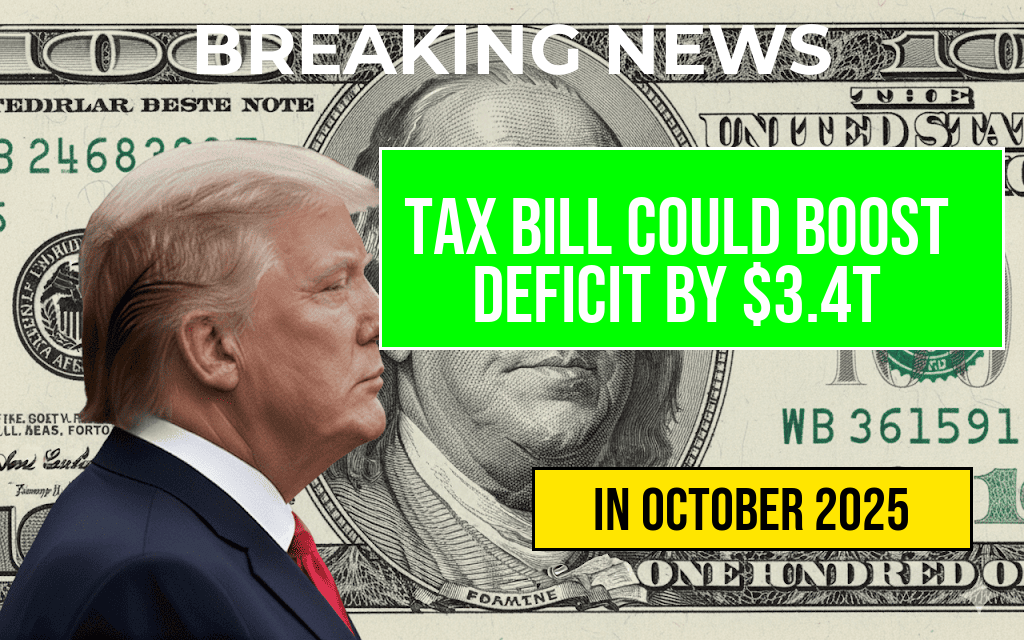Legislators and fiscal analysts are raising alarms over the proposed ‘One Big Beautiful Bill’, a comprehensive package of tax reforms and government spending initiatives. According to recent estimates from independent economic analysts, if enacted as currently drafted, the legislation could lead to an increase in the federal deficit by approximately $3.4 trillion over the next decade. This projected surge in borrowing has sparked widespread concern among policymakers, fiscal watchdogs, and taxpayers alike, emphasizing the potential long-term economic implications of a significantly enlarged national debt. The bill, which aims to overhaul multiple sectors including healthcare, infrastructure, and corporate taxation, has met with mixed reactions, with supporters touting its potential to stimulate growth and opponents warning of the fiscal risks inherent in such expansive spending and tax measures.
Breakdown of the Legislation’s Financial Impact
Major Components and Cost Estimates
| Component | Estimated Cost/Impact | Description |
|---|---|---|
| Healthcare Expansion | +$1.2 trillion | Includes funding for Medicaid and subsidies, expanding coverage for millions. |
| Infrastructure Investment | +$800 billion | Massive funding for roads, bridges, and public transit projects. |
| Corporate Tax Reforms | -$500 billion in revenue | Reduces corporate tax rates and introduces new incentives. |
| Individual Tax Measures | +$700 billion | Includes adjustments to income brackets and deductions. |
| Other Spending | +$1 billion | Funding for education, research, and climate initiatives. |
Projected Deficit Increase
According to estimates from the Congressional Budget Office (CBO), if the bill passes in its current form, the federal deficit could swell by $3.4 trillion over a ten-year period. This figure accounts for increased spending and the revenue shortfalls stemming from tax cuts and incentives. The cumulative effect would push the national debt to levels not seen since the aftermath of World War II, raising concerns about debt sustainability and future fiscal flexibility.
Political and Economic Reactions
Supporters’ Perspective
Proponents of the ‘One Big Beautiful Bill’ argue that the investment in infrastructure and healthcare is essential for long-term economic growth. They contend that targeted tax reforms will boost corporate competitiveness and create jobs. Economic growth advocates believe that strategic government spending can stimulate economic activity enough to offset short-term deficits, ultimately leading to higher revenues over time.
Opposition and Concerns
Opponents warn that the projected increase in the deficit could exacerbate inflationary pressures and lead to higher interest rates. Financial experts emphasize that ballooning debt may limit future policy options and burden taxpayers with higher interest payments. Several fiscal watchdog groups have called for more rigorous analysis of the bill’s long-term impacts, emphasizing the importance of fiscal responsibility amid mounting national obligations.
Historical Context and Future Outlook
The current debate echoes historical concerns about fiscal discipline during periods of expansive government spending. Past legislative efforts, such as the Affordable Care Act and stimulus packages, have shown that large-scale fiscal measures can deliver economic benefits but also pose challenges for debt management. As Congress considers the ‘One Big Beautiful Bill’, the focus remains on balancing immediate economic recovery needs with sustainable fiscal policies.
Potential Policy Alternatives
- Implementing targeted spending with strict caps
- Phasing in tax reforms over a longer period
- Enhancing revenue through closing tax loopholes
- Prioritizing investments with high economic multipliers
Ultimately, the bill’s passage could significantly reshape the nation’s fiscal landscape, making transparency and rigorous analysis critical in decision-making processes. As debates unfold in legislative chambers, taxpayers and policymakers alike will need to grapple with the trade-offs between immediate economic gains and long-term fiscal health.
Frequently Asked Questions
What is the main concern regarding the ‘One Big Beautiful Bill’?
The primary concern is that the bill will significantly increase the national deficit by approximately three point four trillion dollars.
How will the bill impact the country’s fiscal health?
The bill is projected to worsen the fiscal situation by adding a substantial amount to the public debt, potentially affecting economic stability and future government spending.
Who is most affected by the proposed changes in the bill?
While specifics depend on the bill’s provisions, generally taxpayers, government agencies, and public services may be impacted, especially if increased deficit spending leads to budget constraints.
Are there any benefits claimed by supporters of the bill?
Supporters argue that the bill aims to stimulate economic growth and create jobs, but critics warn that the costs may outweigh these benefits.
What should taxpayers do in response to this alert?
Taxpayers are advised to stay informed about policy developments, evaluate how the bill may affect their financial situation, and consider consulting a financial advisor for guidance.

Leave a Reply